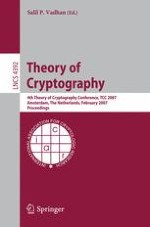2007 | OriginalPaper | Buchkapitel
Unifying Classical and Quantum Key Distillation
verfasst von : Matthias Christandl, Artur Ekert, Michał Horodecki, Paweł Horodecki, Jonathan Oppenheim, Renato Renner
Erschienen in: Theory of Cryptography
Verlag: Springer Berlin Heidelberg
Aktivieren Sie unsere intelligente Suche, um passende Fachinhalte oder Patente zu finden.
Wählen Sie Textabschnitte aus um mit Künstlicher Intelligenz passenden Patente zu finden. powered by
Markieren Sie Textabschnitte, um KI-gestützt weitere passende Inhalte zu finden. powered by
Assume that two distant parties, Alice and Bob, as well as an adversary, Eve, have access to (quantum) systems prepared jointly according to a tripartite state
ρ
ABE
. In addition, Alice and Bob can use local operations and authenticated public classical communication. Their goal is to establish a key which is unknown to Eve. We initiate the study of this scenario as a unification of two standard scenarios: (i) key distillation (agreement) from classical correlations and (ii) key distillation from pure tripartite quantum states.
Firstly, we obtain generalisations of fundamental results related to scenarios (i) and (ii), including upper bounds on the key rate, i.e., the number of key bits that can be extracted per copy of
ρ
ABE
. Moreover, based on an embedding of classical distributions into quantum states, we are able to find new connections between protocols and quantities in the standard scenarios (i) and (ii).
Secondly, we study specific properties of key distillation protocols. In particular, we show that every protocol that makes use of pre-shared key can be transformed into an equally efficient protocol which needs no pre-shared key. This result is of practical significance as it applies to quantum key distribution (QKD) protocols, but it also implies that the key rate cannot be locked with information on Eve’s side. Finally, we exhibit an arbitrarily large separation between the key rate in the standard setting where Eve is equipped with quantum memory and the key rate in a setting where Eve is only given classical memory. This shows that assumptions on the nature of Eve’s memory are important in order to determine the correct security threshold in QKD.
